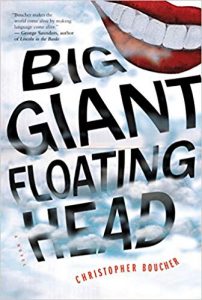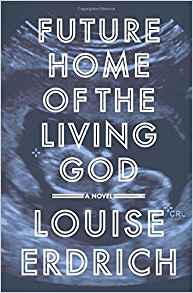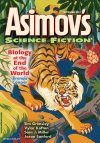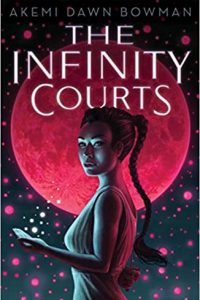Ian Mond Reviews Big Giant Floating Head by Christopher Boucher
 Big Giant Floating Head, Christopher Boucher (Melville House 978-1612197579, $16.99, 224pp, tp) June 2019.
Big Giant Floating Head, Christopher Boucher (Melville House 978-1612197579, $16.99, 224pp, tp) June 2019.
In his new novel, Big Giant Floating Head, Christoper Boucher takes us to the fictional town of Coolidge MA where his alter-ego, also named Christopher Boucher, is struggling to cope with his wife’s decision to leave him. As Boucher informs us, the news came unexpectedly via Twitter. “You can go back on her timeline and read the tweet @bouchergutter, I don’t love you anymore.” On that same day, while reeling from the emotional gut-punch, Boucher witnesses a face bobbing up and down in the sky.
From that angle I could see the whole thing: blue eyes, brown hair, chin stubble – a big giant floating head, staring right at me with a smile on his face like he was listening to a joke.
As Boucher and his mate Bill discover, the head isn’t a balloon but an actual giant head, one that bleeds when you shoot it out of the sky. It’s also not the only one – very soon there are millions, billions of floating heads spread across the world, including one, a spitting image of Boucher, suspended over Chiba in Japan. When a head matching Liz appears, drifting toward the Boucher-head, Christopher views it as a sign that he can save their marriage.
The giant heads are a taste of the weirdness that’s to follow. The novel, which comprises 16 chapters and has all the hallmarks of a short story collection, features a series of absurd and surreal concepts, all, for the most part, anchored around Christopher’s separation and ultimate divorce from his wife. This includes Christopher Boucher attending Christopher Boucher University with other Christopher Bouchers so he can reach his full potential as Christopher Boucher (“CBU”); and Christopher Boucher waking up one morning to discover a wall sprouting from his head that, eventually splits him in two (“Bodywall”); and Christopher Boucher falling in love with a woman with an invisible dog, while at the same time fighting his arch-nemesis, the Narrator, whose words have the power to change reality (“Lady with Invisible Dog”). That latter chapter also features Tomorrow Books, a shopfront owned by Boucher, that sells “books you’d never seen before… made of wood, or wire, or cloud, or light, or suggestions.” This playful attitude toward books and fiction as a medium extends to stories like “The Language Zoo” where words and phrases break-out of their enclosures and “jump out of the story” into adjacent pages of the novel, and the “Beautiful Outlaw”, which is set, for the most part, in the scaffolding, scenes, and set-pieces of Big Giant Floating Head.
Big Giant Floating Head is indicative of the sort of fiction I fell in love with back in 2007 when I was blown away by Robert Shearman’s first collection Tiny Deaths. It’s storytelling that views the world through a distorted lens, that has a strong emotional core, that uses the absurd to highlight our foibles and make observations about the human condition. As such, I enjoyed stories (or chapters) like “Slippery” where everything becomes so “wet and slick” that Boucher can neither tie his shoelaces nor remember his name, and the nostalgic “Hotel” where our protagonist visits an establishment that contains, in its rooms and corridors, everyone important to Boucher – his family home, his parents, his ex-girlfriends. My favourite story, one that’s best at marrying together the uncanny with the poignant, is “Trout Heart”. It starts off as a comic piece where Boucher’s heart organises a replacement organ – a trout – while it goes on holiday, but then gradually shifts register, becoming a dark, edgy story about suicide.
Despite how much I admired some of the individual pieces, I was surprised to discover that I didn’t love Big Giant Floating Head. This is partly because I found the typographical and meta-fictional shenanigans to be overly familiar, a post-modern flourish that’s become almost mainstream because of writers like Jasper Fforde. My biggest issue though, and this goes back to what drew me to this kind of fiction in the first place, is that, when regarded as a novel, not a short story collection, I wasn’t invested in how the weirdness and absurdity informed the larger tale. This is because Boucher isn’t kind to his characters, beginning with his alter-ego, portrayed as that most annoying, cringe-worthy of tropes, the neurotic nebbish, a market once cornered by Woody Allen and his successor George Costanza that’s become far too prevalent in fiction these days. I also wasn’t keen on the caricature of Boucher’s fictional ex-wife, who is depicted as spiteful and vindictive, leaving her husband over Twitter and taking possession of Boucher’s car while lying to him that she sold it. The final chapter, “The Unloveables”, where Boucher joins a volunteer group consisting of members who are no longer loved by anyone, does smooth over some of Liz’s rougher edges, but Boucher (the author) still can’t help but punish his ex-wife by having Felix, Liz’s new husband, leave her. “I said some awful things to him, and he got very upset – I’m so stupid, stupid!”
Big Giant Floating Head is filled with wonderfully inventive, off-kilter ideas, images, and set pieces. It’s also a novel that undercuts its playful joy for language and fiction by being mean-spirited, by showing little love or empathy for its characters.
Ian Mond loves to talk about books. For eight years he co-hosted a book podcast, The Writer and the Critic, with Kirstyn McDermott. Recently he has revived his blog, The Hysterical Hamster, and is again posting mostly vulgar reviews on an eclectic range of literary and genre novels. You can also follow Ian on Twitter (@Mondyboy) or contact him at mondyboy74@gmail.com.
This review and more like it in the July 2019 issue of Locus.
 While you are here, please take a moment to support Locus with a one-time or recurring donation. We rely on reader donations to keep the magazine and site going, and would like to keep the site paywall free, but WE NEED YOUR FINANCIAL SUPPORT to continue quality coverage of the science fiction and fantasy field.
While you are here, please take a moment to support Locus with a one-time or recurring donation. We rely on reader donations to keep the magazine and site going, and would like to keep the site paywall free, but WE NEED YOUR FINANCIAL SUPPORT to continue quality coverage of the science fiction and fantasy field.








